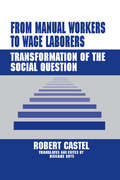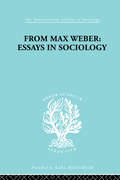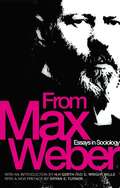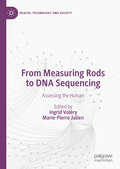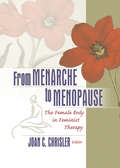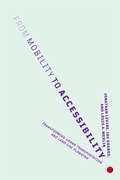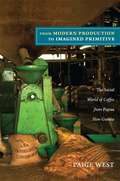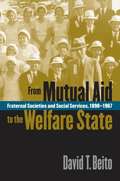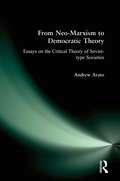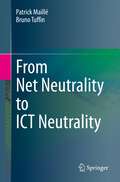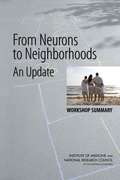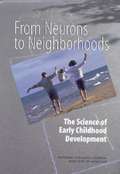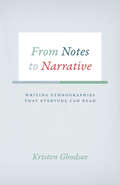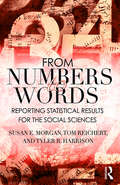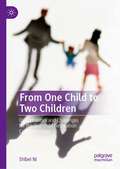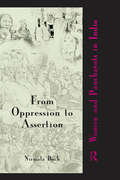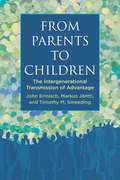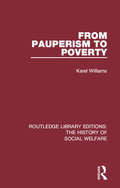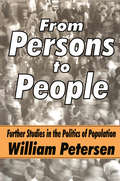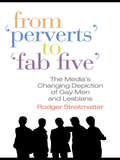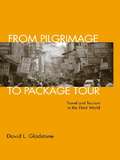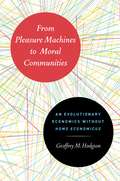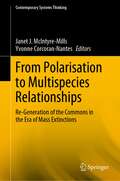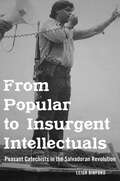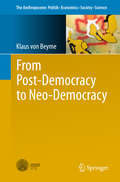- Table View
- List View
From Manual Workers to Wage Laborers: Transformation of the Social Question
by Robert CastelIn this monumental book, sociologist Robert Castel reconstructs the history of what he calls "the social question," or the ways in which both labor and social welfare have been organized from the Middle Ages onward to contemporary industrial society. Throughout, the author identifies two constants bearing directly on the question of who is entitled to relief and who can be excluded: the degree of embeddedness in any given community and the ability to work. Along this dual axis the author locates virtually the entire history of social welfare in early-modern and contemporary Europe.This work is a systematic defense of the meaningfulness of the category of "the social," written in the tradition of Foucault, Durkheim, and Marx. Castel imaginatively builds on Durkheim's insight into the essentially social basis of work and welfare. Castel populates his sociological framework with vivid characterizations of the transient lives of the "disaffiliated": those colorful itinerants whose very existence proved such a threat to the social fabric of early-modern Europe. Not surprisingly, he discovers that the cruel and punitive measures often directed against these marginal figures are deeply implicated in the techniques and institutions of power and social control.The author also treats the flipside of the problem of social assistance: namely, matters of work and wage-labor. Castel brilliantly reveals how the seemingly objective line of demarcation between able-bodied beggars those who are capable of work but who chose not to do so and those who are truly disabled becomes stretched in modernity to make room for the category of the "working poor." It is the novel crisis posed by those masses of population who are unable to maintain themselves by their labor alone that most deeply challenges modern societies and forges recognizably modern policies of social assistance.The author's gloss on the social question also offers us valuable perspectives on contempo
From Max Weber: Essays In Sociology (International Library of Sociology #Vol. 4)
by C. Wright Mills H. H. GerthFirst published in 1998. Routledge is an imprint of Taylor & Francis, an informa company.
From Max Weber: Essays in Sociology (Routledge Classics In Sociology Ser. #Vol. 4)
by Max WeberMax Weber (1864-1920) was one of the most prolific and influential sociologists of the twentieth century. This classic collection draws together his key papers. This edition contains a new preface by Professor Bryan S. Turner.
From Measuring Rods to DNA Sequencing: Assessing the Human (Health, Technology and Society)
by Ingrid Voléry Marie-Pierre JulienThis book provides a solid basis to understand two centuries of bodily measurement practices and their scientific and political scope throughout the Western world. By exploring various cases, it proposes a new approach of measurement from an epistemological point of view and demonstrates the central role of the measurement of the body for political purposes. By studying categorizations of race, age and quality of life between the 19th and 20th century, the first part of the book highlights how human body measurements extend from the flesh to subjective experience. The second part shows how genomic correction and life support technologies reshape the frontiers between things, humans and social subjects. The final part reveals how contemporary measurements of age, race and disease gave rise to new hierarchies between human beings and social groups. The book concludes by considering different styles of measuring the body and their ontological consequences.
From Menarche to Menopause: The Female Body in Feminist Therapy
by Joan ChrislerFrom Menarche to Menopause: The Female Body in Feminist Therapy examines the latest research on the menstrual cycle and women&’s reproductive health. This timely volume focuses on women in therapy who are disconnected from-or even repelled by-their own bodies due to cultural attitudes, abuse, trauma, or the natural aging process. Experts in the fields of psychology and women&’s health unite to celebrate the physical life stages of women and girls and to offer practical advice for therapists to use when addressing negativity caused by appearance, age, menstrual symptoms, or reproductive concerns. In this book, you will gain new understanding about the effects on a woman&’s mental health that transitional life stages can cause, from preadolescence through the childbearing years to menopause. The suggestions in From Menarche to Menopause can help women resist the bombardment of negative messages and misleading information they receive about their bodies and their reproductive concerns. This helpful resource can also assist you in opening new lines of communication between mothers and daughter, women and men, and women and other women. From Menarche to Menopause discusses how to handle topics such as: self-loathing caused by media and cultural messages that affect women&’s acceptance of their bodies overcoming a daughter&’s reluctance to discuss sensitive topics of bodily maturation, menstruation, and emerging sexual development helping women, men, and couples cope with infertility assisting women in overcoming a disappointing birth experience providing therapeutic care to women and couples who experience perinatal loss addressing perimenopause in midlife women and the concerns, negative attitudes, and uncertainty of this transition This unique book fills the gap in feminist therapy literature with practical advice concerning the functions of women&’s bodies that can be used within the therapy context. From Menarche to Menopause includes extensive references and several book reviews to further your research and provide reading and other resources you can recommend to your clients. This practical resource on women&’s reproductive health-as it relates to mental health-is an important addition to the bookshelves of feminist psychologists, clinical practitioners, social workers, and health practitioners as well as faculty and students of these disciplines.
From Mobility to Accessibility: Transforming Urban Transportation and Land-Use Planning
by Jonathan Levine Joe Grengs Louis A. MerlinIn From Mobility to Accessibility, an expert team of researchers flips the tables on the standard models for evaluating regional transportation performance. Jonathan Levine, Joe Grengs, and Louis A. Merlin argue for an "accessibility shift" whereby transportation planning, and the transportation dimensions of land-use planning, would be based on people's ability to reach destinations, rather than on their ability to travel fast. Existing models for planning and evaluating transportation, which have taken vehicle speeds as the most important measure, would make sense if movement were the purpose of transportation. But it is the ability to reach destinations, not movement per se, that people seek from their transportation systems. While the concept of accessibility has been around for the better part of a century, From Mobility to Accessibility shows that the accessibility shift is compelled by the fundamental purpose of transportation. The book argues that the shift would be transformative to the practice of both transportation and land-use planning but is impeded by many conceptual obstacles regarding the nature of accessibility and its potential for guiding development of the built environment. By redefining success in transportation, the book provides city planners, decisionmakers, and scholars a path to reforming the practice of transportation and land-use planning in modern cities and metropolitan areas.
From Modern Production to Imagined Primitive: The Social World of Coffee from Papua New Guinea
by Paige WestIn this vivid ethnography, the author tracks coffee as it moves from producers in Papua New Guinea to consumers around the world.
From Mutual Aid to the Welfare State
by David T. BeitoDuring the late nineteenth and early twentieth centuries, more Americans belonged to fraternal societies than to any other kind of voluntary association, with the possible exception of churches. Despite the stereotypical image of the lodge as the exclusive domain of white men, fraternalism cut across race, class, and gender lines to include women, African Americans, and immigrants. Exploring the history and impact of fraternal societies in the United States, David Beito uncovers the vital importance they had in the social and fiscal lives of millions of American families.Much more than a means of addressing deep-seated cultural, psychological, and gender needs, fraternal societies gave Americans a way to provide themselves with social-welfare services that would otherwise have been inaccessible, Beito argues. In addition to creating vast social and mutual aid networks among the poor and in the working class, they made affordable life and health insurance available to their members and established hospitals, orphanages, and homes for the elderly. Fraternal societies continued their commitment to mutual aid even into the early years of the Great Depression, Beito says, but changing cultural attitudes and the expanding welfare state eventually propelled their decline.
From Neo-Marxism to Democratic Theory: Essays on the Critical Theory of Soviet-type Societies
by Andrew AratoThe essays in this volume trace an intellectual odyssey, a search for a genuinely critical theory. The book begins with the question of why the Frankfurt School as well as other neo-Marxist and post-Marxist analysts, both in the West and in dissident circles in the East, failed to produce a critical theory of Soviet socialism or to establish a dynamic relationship with contemporary social movements. As the political struggle in Eastern Europe intensified, the author of this book disengaged from his own efforts to reconstruct a critical Marxism. Instead, he attempts a reconstruction of democratic theory based on civil society rather than class categories, and with a critical relevance not only to the transition from state socialism but more generally to the universal goal of emancipation.
From Net Neutrality to ICT Neutrality
by Patrick Maillé Bruno TuffinThis book discusses the pros and cons of information and communication (ICT) neutrality. It tries to be as objective as possible from arguments of proponents and opponents, this way enabling readers to build their own opinion. It presents the history of the ongoing network neutrality debate, the various concepts it encompasses, and also some mathematical developments illustrating optimal strategies and potential counter-intuitive results, then extends the discussion to connected ICT domains. The book thus touches issues related to history, economics, law, networking, and mathematics. After an introductory chapter on the history of the topic, chapter 2 surveys and compares the various laws in place worldwide and discusses some implications of heterogeneous rules in several regions. Next, chapter 3 details the arguments put forward by the participants of the net neutrality debate. Chapter 4 then presents how the impact of neutral or non-neutral behaviors can be analyzed mathematically, with sometimes counter-intuitive results, and emphasizes the interest of modeling to avoid bad decisions. Chapter 5 illustrates that content providers may not always be on the pro-neutrality side, as there are situations where they may have an economic advantage with a non-neutral situation, e.g. when they are leaders on a market and create barriers to entry for competitors. Another related issue is covered in chapter 6, which discusses existing ways for ISPs to circumvent the packet-based rules and behave non-neutral without breaking the written law. Chapter 7 gives more insight on the role and possible non-neutral behavior of search engines, leading to another debate called the search neutrality debate. Chapter 8 focuses on e-commerce platforms and social networks, and investigates how they can influence users’ actions and opinions. The issue is linked to the debate on the transparency of algorithms which is active in Europe especially. Chapter 9 focuses on enforcing neutrality in practice through measurements: indeed, setting rules requires monitoring the activity of ICT actors in order to sanction non-appropriate behaviors and be proactive against new conducts. The chapter explains why this is challenging and what tools are currently available. Eventually, Chapter 10 briefly concludes the presentation and opens the debate.
From Neurons to Neighborhoods
by Institute of Medicine National Research Council Steve Olson Board on Children, Youth, and Families Division of Behavioral and Social Sciences and EducationFrom Neurons to Neighborhoods: An Update: Workshop Summary is based on the original study From Neurons to Neighborhoods: Early Childhood Development, which released in October of 2000. From the time of the original publication's release, much has occurred to cause a fundamental reexamination of the nation's response to the needs of young children and families, drawing upon a wealth of scientific knowledge that has emerged in recent decades. The study shaped policy agendas and intervention efforts at national, state, and local levels. It captured a gratifying level of attention in the United States and around the world and has helped to foster a highly dynamic and increasingly visible science of early childhood development. It contributed to a growing public understanding of the foundational importance of the early childhood years and has stimulated a global conversation about the unmet needs of millions of young children. Ten years later, the Board on Children, Youth, and Families of the Institute of Medicine (IOM) and the National Research Council (NRC) held a 2-day workshop in Washington, D.C., to review and commemorate a decade of advances related to the mission of the report. The workshop began with a series of highly interactive breakout sessions in which experts in early childhood development examined the four organizing themes of the original report and identified both measurable progress and remaining challenges. The second day of the workshop, speakers chosen for their diverse perspectives on early childhood research and policy issues discussed how to build on the accomplishments of the past decade and to launch the next era in early childhood science, policy, and practice. From Neurons to Neighborhoods: An Update: Workshop Summary emphasizes that there is a single, integrated science of early childhood development despite the extent to which it is carved up and divided among a diversity of professional disciplines, policy sectors, and service delivery systems. While much work still remains to be done to reach this goal, the 2010 workshop demonstrated both the promise of this integrated science and the rich diversity of contributions to that science.
From Neurons to Neighborhoods: The Science of Early Childhood Development
by Institute of Medicine Staff Jack P. Shonkoff Deborah A. Phillips Committee on Integrating the Science of Early Childhood Development Board on Children, Youth and Families StaffHow we raise young children is one of today's most highly personalized and sharply politicized issues, in part because each of us can claim some level of "expertise." The debate has intensified as discoveries about our development-in the womb and in the first months and years-have reached the popular media. How can we use our burgeoning knowledge to assure the well-being of all young children, for their own sake as well as for the sake of our nation? Drawing from new findings, this book presents important conclusions about nature-versus-nurture, the impact of being born into a working family, the effect of politics on programs for children, the costs and benefits of intervention, and other issues. The committee issues a series of challenges to decision makers regarding the quality of child care, issues of racial and ethnic diversity, the integration of children's cognitive and emotional development, and more. Authoritative yet accessible, From Neurons to Neighborhoods presents the evidence about "brain wiring" and how kids learn to speak, think, and regulate their behavior. It examines the effect of the climate-family, child care, community-within which the child grows.
From Notes to Narrative: Writing Ethnographies That Everyone Can Read (Chicago Guides to Writing, Editing, and Publishing)
by Kristen GhodseeEthnography centers on the culture of everyday life. So it is ironic that most scholars who do research on the intimate experiences of ordinary people write their books in a style that those people cannot understand. In recent years, the ethnographic method has spread from its original home in cultural anthropology to fields such as sociology, marketing, media studies, law, criminology, education, cultural studies, history, geography, and political science. Yet, while more and more students and practitioners are learning how to write ethnographies, there is little or no training on how to write ethnographies well. From Notes to Narrative picks up where methodological training leaves off. Kristen Ghodsee, an award-winning ethnographer, addresses common issues that arise in ethnographic writing. Ghodsee works through sentence-level details, such as word choice and structure. She also tackles bigger-picture elements, such as how to incorporate theory and ethnographic details, how to effectively deploy dialogue, and how to avoid distracting elements such as long block quotations and in-text citations. She includes excerpts and examples from model ethnographies. The book concludes with a bibliography of other useful writing guides and nearly one hundred examples of eminently readable ethnographic books.
From Numbers to Words: Reporting Statistical Results for the Social Sciences
by Tom Reichert Susan Morgan Tyler R. HarrisonThis invaluable resource guides readers through the process of creating scholarly, publishable prose from the results of quantitative experiments and investigations. It delves into the issues commonly encountered when reporting the results of statistical experiments and investigations, and provides instruction re the representation of these results in text and visual formats. This unique research companion serves as a must-have reference for advanced students doing quantitative research and working with statistics, with the goal of writing up and publishing their findings; it also serves as a useful refresher for experienced researchers.
From One Child to Two Children: Opportunities and Challenges for the One-child Generation Cohort in China
by Shibei NiThis book dissects the reproductive intentions and behaviours of the one-child generation cohort in China, situated in the wider context of changing family life patterns and gendered lenses. Demonstrating that the one-child family is still favoured by the one-child generation, this book uncovers the socioeconomic dimensions and mechanisms of family relations underlying young people’s decision-making processes. It also incorporates individual considerations and experiences of childbearing from over 50 interviews to contribute to the development of China's social policy. Whereas men’s childbearing beliefs were relatively unexplored in the literature, the author included male interviewees to better reflect gender differences in relation to childbearing, employment and family. Analysing the relationship between life routine and the desire (or lack thereof) to increase China's population, the author argues that the current childbearing policy fails to accommodate the needs and demands of young people, thus limiting the uptake of China’s new policy.
From Oppression to Assertion: Women and Panchayats in India
by Nirmala BuchThe book explores the experiences, impact and responses of women in village panchayats in India after a Constitutional Amendment in 1992 made it mandatory to reserve one-third positions for women. Based on extensive field research with interviews of 1,200 panchayat representatives and community members in Madhya Pradesh, Rajasthan and Uttar Pradesh (states usually seen as low on social and gender indicators), the book documents awareness, motivation, perceptions, and participation levels of women elected in the first election following the Amendment, with a follow-up survey of the same panchayats in the next two elections. This work maps the empowering impact on women’s self, the attitudes and perceptions of the family and responses of other social institutions. It explodes the myth of women’s disinterest in politics, the entry of only affluent women and relatives of influential politicians, and particularly, of these women as proxy for their male kin. The recent policy announcements reserving more seats for women in panchayats (from one-third to one-half) makes this book topical, and especially interesting in light of the opposition to the reservation of seats for women in state legislatures and the parliament.
From Parents to Children: The Intergenerational Transmission of Advantage
by Timothy M. Smeeding John Ermisch Markus JanttiDoes economic inequality in one generation lead to inequality of opportunity in the next? In From Parents to Children, an esteemed international group of scholars investigates this question using data from ten countries with differing levels of inequality. The book compares whether and how parents' resources transmit advantage to their children at different stages of development and sheds light on the structural differences among countries that may influence intergenerational mobility. How and why is economic mobility higher in some countries than in others? The contributors find that inequality in mobility-relevant skills emerges early in childhood in all of the countries studied. Bruce Bradbury and his coauthors focus on learning readiness among young children and show that as early as age five, large disparities in cognitive and other mobility-relevant skills develop between low- and high-income kids, particularly in the United States and the United Kingdom. Such disparities may be mitigated by investments in early childhood education, as Christelle Dumas and Arnaud Lefranc demonstrate. They find that universal pre-school education in France lessens the negative effect of low parental SES and gives low-income children a greater shot at social mobility. Katherine Magnuson, Jane Waldfogel, and Elizabeth Washbrook find that income-based gaps in cognitive achievement in the United States and the United Kingdom widen as children reach adolescence. Robert Haveman and his coauthors show that the effect of parental income on test scores increases as children age; and in both the United States and Canada, having parents with a higher income betters the chances that a child will enroll in college. As economic inequality in the United States continues to rise, the national policy conversation will not only need to address the devastating effects of rising inequality in this generation but also the potential consequences of the decline in mobility from one generation to the next. Drawing on unparalleled international datasets, From Parents to Children provides an important first step.
From Pauperism to Poverty (Routledge Library Editions: The History of Social Welfare #24)
by Karel WilliamsFirst published in 1981, From Pauperism to Poverty consists of seven essays, three of which focus on the English poor law between 1800 and 1914 and four of which examine texts of social investigation by Mayhew, Engels, Booth and Rowntree. Rather than making a specialist contribution to the history of social thought and policy, the essays raise general questions about current ways of writing history and alternative analyses of specific texts or institutions are developed. In doing so, the previous histories of the relief of pauperism and the discovery of poverty are revised at many points. Most notably, it is demonstrated for the first time that relief to unemployed men was virtually abolished after 1850. This book will be of interest to those studying the history of social welfare and poverty.
From Persons to People: A Second Primer in Demography
by William PetersenProblems associated with aggregation and classification are the underlying theme of this book. When data assembled from individuals are presented as group characteristics, this process has logical complications. Racial profiling and ethnic discrimination are obvious examples of the problem. Petersen's book analyzes in general how information from "persons" turns into statistics about specific "people." The book is divided into two parts covering population and ethnicity. The first two chapters in part 1, on population statistics and the age-sex structure, are the foundations for any demographic analysis. Chapter 3 is a brief review of the interminable debate over whether the subsistence of mankind is on the point of depletion. The three following chapters are on population theory as expounded by Malthus, Marx, and Communists. Chapters 7 and 8 discuss the competition between parents and the state concerning which of the two shall decide on procreation. Chapter 9 is an account of population at the frontier, using Nevada as a prototype. The last chapter in part 1 is a proposal, to moderate the endless debate about abortion. The first two chapters in the second part of the book concern methods for analyzing ethnicity that are essential for a full understanding of demography: how and by whom ethnic groups are defined. The next chapter discusses some of the many subdivisions of European nations, countering the analyses of European unity with the fact that most of its regions are not themselves homogeneous. In a number of instances American statistical agencies have used surnames to identify nationalities, with invalid results, as the author shows in the next chapter. "Jews as a Race" is an attempt to counter Nazi dogma with a rational analysis of a contentious topic. The subsequent chapters compare Japanese and Chinese Americans as small but fascinating minorities and analyze the social consequences of religion from theoretical and factual viewpoints. The last chapter summarizes the conclusions to be drawn from these topics. Demographers, sociologists, and statisticians, as well as those generally concerned with social policy, will find From Persons to People useful and courageous-the hallmark of the dean of sociological demography. .
From Perverts to Fab Five: The Media's Changing Depiction of Gay Men and Lesbians
by Rodger StreitmatterFrom "Perverts" to "Fab Five" tracks the dramatic change in how the American media have depicted gay people over the last half-century. Each chapter illuminates a particular media product that served as a milestone on the media's journey from demonizing homosexuals some fifty years ago to celebrating gay people--or at least some categories of gay people--today. The media, Streitmatter argues, have not merely reflected the American public's shift to a more enlightened view of gay people, but they have been instrumental in propelling that change. The book spans the breadth of communication venues. Individual chapters focus on major news stories, entertainment television programs, and mainstream motion pictures that captured the public imagination while, at the same time, sending powerful messages about gay men and lesbians. Ideal for any reader interested in the changing depiction of gay men and lesbians in the media over time, or as required reading in media courses.
From Pilgrimage to Package Tour: Travel and Tourism in the Third World
by David L. GladstoneWhen people in First World countries think of tourists in the vast expanses of the Third World today, they typically think of pampered westerners, filling up the luxury hotels and imposing their Orientalist gazes on the teeming masses. As David Gladstone shows us in this fascinating and provocative book, such preconceptions are wrong. Coupling incisive and colorful ethnographic accounts of tourism in India and Mexico with sharp analysis, Gladstone demonstrates the amazing complexity of this industry, which now comprises close to ten percent of the world economy. As he also shows, the vast majority of tourists in the Third World are indigenous people with few resources-often making pilgrimages to religious shrines.From Pilgrimage to Package Tour is a fresh and entirely original account that stands tourism studies on its head and proves that this industry is far more complicated than it initially appears.
From Pleasure Machines to Moral Communities: An Evolutionary Economics without Homo economicus
by Geoffrey M. HodgsonAre humans at their core seekers of their own pleasure or cooperative members of society? Paradoxically, they are both. Pleasure-seeking can take place only within the context of what works within a defined community, and central to any community are the evolved codes and principles guiding appropriate behavior, or morality. The complex interaction of morality and self-interest is at the heart of Geoffrey M. Hodgson's approach to evolutionary economics, which is designed to bring about a better understanding of human behavior. In From Pleasure Machines to Moral Communities, Hodgson casts a critical eye on neoclassical individualism, its foundations and flaws, and turns to recent insights from research on the evolutionary bases of human behavior. He focuses his attention on the evolution of morality, its meaning, why it came about, and how it influences human attitudes and behavior. This more nuanced understanding sets the stage for a fascinating investigation of its implications on a range of pressing issues drawn from diverse environments, including the business world and crucial policy realms like health care and ecology. This book provides a valuable complement to Hodgson's earlier work with Thorbjorn Knudsen on evolutionary economics in Darwin's Conjecture, extending the evolutionary outlook to include moral and policy-related issues.
From Polarisation to Multispecies Relationships: Re-Generation of the Commons in the Era of Mass Extinctions (Contemporary Systems Thinking)
by Yvonne Corcoran-Nantes Janet J. McIntyre-MillsThis book explores the concept of multi-species relationships and suggests critical systemic pathways to protect shared habitats. This book discusses how the eradication of species as a result of rapid urbanisation places humanity at risk. This book demonstrates how narrow anthropocentrism has focused on the rights of human beings at the expense of other species and the environment. This book explores a priori norms and a posteriori measures and indicators to include and protect multiple species. This book aims to strengthen institutional capacity and powers to address and extend the UN 2030 Sustainable Development Agenda by drawing on local wisdom but also the need to implement laws to prevent ecocide. This book highlights that our fragile interdependence requires a recognition of our hybridity and interconnectedness within the web of life and suggests ways to reframe policy within and beyond the nation state to support living systems of which we are a strand.
From Popular to Insurgent Intellectuals: Peasant Catechists in the Salvadoran Revolution
by Leigh BinfordFrom Popular to Insurgent Intellectuals explains how a group of Catholic lay catechists educated in liberation theology came to take up arms and participate on the side of the rebel FMLN during El Salvador’s revolutionary war (1980-92). In the process they became transformed from popular intellectuals to insurgent intellectuals who put their organizational and cognitive skills at the service of a collective effort to create a more egalitarian and democratic society. The book highlights the key roles that peasant catechists in northern Morazán played in disseminating liberation theology before the war and supporting the FMLN during it—as quartermasters, political activists, and musicians, among other roles. Throughout, From Popular to Insurgent Intellectuals highlights the dialectical nature of relations between Catholic priests and urban revolutionaries, among others, in which the latter learned from the former and vice-versa. Peasant catechists proved capable at making independent decisions based on assessment of their needs and did not simply follow the dictates of those with superior authority, and played an important role for the duration of the twelve-year military conflict.
From Post-democracy to Neo-Democracy (The Anthropocene: Politik—Economics—Society—Science #20)
by Klaus Von BeymeThis book of a renowned political scientist and specialist in political theory fundamentally challenges the new fashion of post-democracy by offering an outlook on ‘neo-democracy’. The political periods are similar to epochs in modern art, where ‘neo’ succeeded Post-impressionism and Post-expressionism. This book reviews the topical debate on postdemocracy and scenarios of decline in democratic theory without the alternative of dictatorship. It discusses criticism of politics in the old and new media and a new culture of protest. It addresses new forms of participation and the dangers of populism and right-wing extremism. It proposes institutional reforms of democracy, of the parliamentary system and the party state, in negotiations of coalition-building, in governmental declarations and for the policy output. The book concludes with a debate of normative models of democracy from ‘Post-democracy’ to ‘Neo-democracy’, models of justice and theories of democratic reform.
